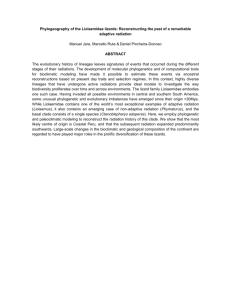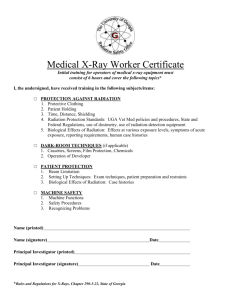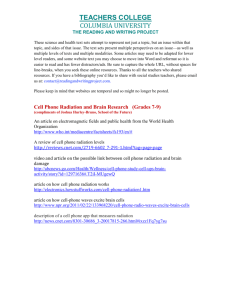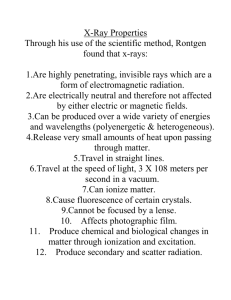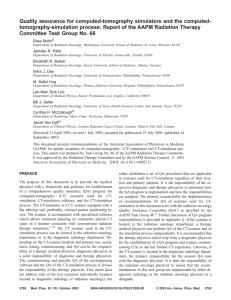MEDICAL PHYSICS UNIT I INTRODUCTION TO MEDICAL PHYSICS:-
advertisement
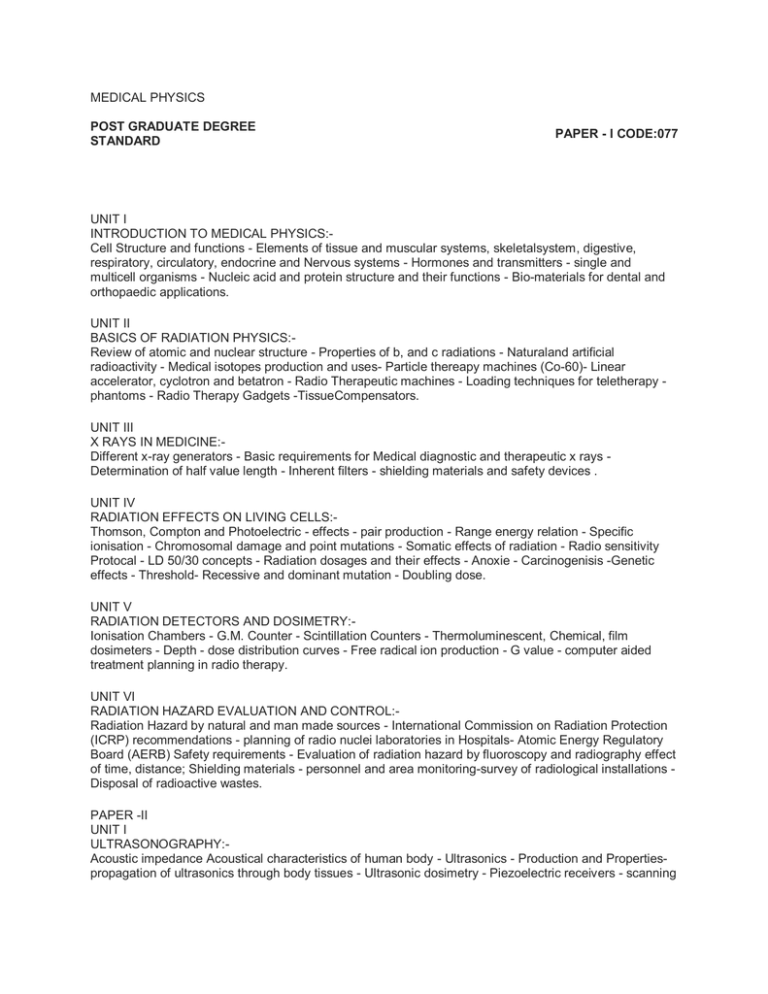
MEDICAL PHYSICS POST GRADUATE DEGREE STANDARD PAPER - I CODE:077 UNIT I INTRODUCTION TO MEDICAL PHYSICS:Cell Structure and functions - Elements of tissue and muscular systems, skeletalsystem, digestive, respiratory, circulatory, endocrine and Nervous systems - Hormones and transmitters - single and multicell organisms - Nucleic acid and protein structure and their functions - Bio-materials for dental and orthopaedic applications. UNIT II BASICS OF RADIATION PHYSICS:Review of atomic and nuclear structure - Properties of b, and c radiations - Naturaland artificial radioactivity - Medical isotopes production and uses- Particle thereapy machines (Co-60)- Linear accelerator, cyclotron and betatron - Radio Therapeutic machines - Loading techniques for teletherapy phantoms - Radio Therapy Gadgets -TissueCompensators. UNIT III X RAYS IN MEDICINE:Different x-ray generators - Basic requirements for Medical diagnostic and therapeutic x rays Determination of half value length - Inherent filters - shielding materials and safety devices . UNIT IV RADIATION EFFECTS ON LIVING CELLS:Thomson, Compton and Photoelectric - effects - pair production - Range energy relation - Specific ionisation - Chromosomal damage and point mutations - Somatic effects of radiation - Radio sensitivity Protocal - LD 50/30 concepts - Radiation dosages and their effects - Anoxie - Carcinogenisis -Genetic effects - Threshold- Recessive and dominant mutation - Doubling dose. UNIT V RADIATION DETECTORS AND DOSIMETRY:Ionisation Chambers - G.M. Counter - Scintillation Counters - Thermoluminescent, Chemical, film dosimeters - Depth - dose distribution curves - Free radical ion production - G value - computer aided treatment planning in radio therapy. UNIT VI RADIATION HAZARD EVALUATION AND CONTROL:Radiation Hazard by natural and man made sources - International Commission on Radiation Protection (ICRP) recommendations - planning of radio nuclei laboratories in Hospitals- Atomic Energy Regulatory Board (AERB) Safety requirements - Evaluation of radiation hazard by fluoroscopy and radiography effect of time, distance; Shielding materials - personnel and area monitoring-survey of radiological installations Disposal of radioactive wastes. PAPER -II UNIT I ULTRASONOGRAPHY:Acoustic impedance Acoustical characteristics of human body - Ultrasonics - Production and Propertiespropagation of ultrasonics through body tissues - Ultrasonic dosimetry - Piezoelectric receivers - scanning techniques - Echocardiography - Ultrasonic tomography - Ultrasonics in Opthalmology-obstetrics and gynecology-Lithostropy- Echocardiography - Ultrasonic diathermy. UNIT II THERMOGRAPHY:Various types of electromagnetic radiations - UV, Visible and IR- sources and detectors- Optical properties of tissues-Applications of optical radiations in detection and treatment of skin disorders. UNIT III RADIOTHERAPY:Radio and Microwaves - production and properties - intervention mechanism with biological systems Hyperthermia - Tissue characterisation - Thermal and non thermal effects on whole body. UNIT IV LASERS IN MEDICINE:Theory and mechanism of medical lasers. Tissue interaction mechanism dermatology oncology - lasers in biology - Application of ultrafast pulsed lasers in Medicine - laser blood flowmeter. Hazards of lasers and their safety measures - Fibre optics in medicine. UNIT V NUCLEAR MEDICINE:Radio isotopes in Medical diagnostics - Scintillation counters - Gamma Cameras - single head - dual head scanners - Scanning of different parts of human body-Radio Pharmaceuticals for scanning. UNIT VI IMAGING SYSTEMS AND DIAGNOSTIC INSTRUMENTS:Magnetic Resonance Imaging system - position Emission tomography-Basic principles and applications ECG, EEG and EMG recording and analysis.
